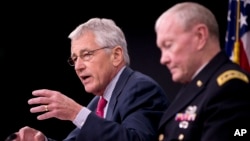The Pentagon’s top officials say the United States will continue to limit its military support in Iraq to an advisory role, though they do not rule out the prospect of greater involvement if the threat by Islamic insurgents increases.
Defense Secretary Chuck Hagel and General Martin Dempsey, chairman of the Joint Chiefs of Staff, said at a Pentagon news briefing Thursday that the U.S. continues to assess the chaotic situation in Iraq.
But none of the 750 U.S. troops now in Iraq are performing combat missions, and “none will,” Hagel said. He said the role of the United States is limited to assessing and advising Iraqis and protecting Americans and U.S. assets.
The U.S. has sent 300 military advisers and has reinforced its security support for U.S. embassy and the airport, the Associated Press reported.
Though fighters with the Islamic State of Iraq and the Levant retain control of numerous cities and large swaths of territory, they are “stretched right now,” Dempsey said, a situation that lessens the urgency for any direct U.S. action.
Iraqi security forces are capable of defending Baghdad, though they’re logistically challenged to go on the offensive, Dempsey said.
But he noted it would be difficult for the U.S. to launch airstrikes against the insurgents because anti-government Sunni groups have intermingled with ISIL.
“It would be a tough challenge to separate them if we were to take a decision to strike,” Dempsey said.
Hagel said the U.S. military has opened a second joint operations center in the northern Iraqi city of Irbil.
The U.S. goal is to give Iraqis more time to develop a political solution to quell the violence that has wracked the country.
“We’re helping to provide our diplomats time and space to work with Sunni, Kurd and Shia political leaders” to form a new unity government," Hagel said.
Iraq’s future depends on its ability to form an inclusive government, Dempsey said.
Unless Prime Minister Nouri al-Maliki’s current Shiite-led government allows all groups to participate, Dempsey said, “everything we’re talking about makes no difference.”
VOA's Jeff Seldin contributed to this report from the Pentagon.




